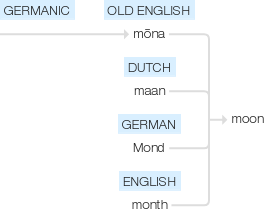Moon
Old English mōna, of Germanic origin; related to Dutch maan and German Mond, also to month, from an Indo-European root shared by Latin mensis and Greek mēn ‘month’, and also Latin metiri ‘to measure’ (the moon being used to measure time).
wiktionary
From Middle English mone, from Old English mōna(“moon”), from Proto-West Germanic *mānō, from Proto-Germanic *mēnô(“moon”), from Proto-Indo-European *mḗh₁n̥s(“moon, month”), probably from *meh₁-(“to measure”).
etymonline
moon (n.)
"heavenly body which revolves about the earth monthly," Middle English mone, from Old English mona, from Proto-Germanic *menon- (source also of Old Saxon and Old High German mano, Old Frisian mona, Old Norse mani, Danish maane, Dutch maan, German Mond, Gothic mena "moon"), from PIE *me(n)ses- "moon, month" (source also of Sanskrit masah "moon, month;" Avestan ma, Persian mah, Armenian mis "month;" Greek mene "moon," men "month;" Latin mensis "month;" Old Church Slavonic meseci, Lithuanian mėnesis "moon, month;" Old Irish mi, Welsh mis, Breton miz "month"), from root *me- (2) "to measure" in reference to the moon's phases as an ancient and universal measure of time.
A masculine noun in Old English. In Greek, Italic, Celtic, and Armenian the cognate words now mean only "month." Greek selēnē (Lesbian selanna) is from selas "light, brightness (of heavenly bodies)." Old Norse also had tungl "moon," ("replacing mani in prose" - Buck), evidently an older Germanic word for "heavenly body," cognate with Gothic tuggl, Old English tungol "heavenly body, constellation," of unknown origin or connection. Hence Old Norse tunglfylling "lunation," tunglœrr "lunatic" (adj.).
Extended 1665 to satellites of other planets. Typical of a place impossible to reach or a thing impossible to obtain, by 1590s. Meaning "a month, the period of the revolution of the moon about the earth" is from late 14c.
To shoot the moon "leave without paying rent" is British slang from c. 1823 (see shoot (v.)); the card-playing sense perhaps was influenced by gambler's shoot the works (1922) "go for broke" in shooting dice. The moon race and the U.S. space program of the 1960s inspired a number of coinages, including, from those skeptical of the benefits to be gained, moondoggle (based on boondoggle). The man in the moon "fancied semblance of a man seen in the disk of the full moon" is mentioned since early 14c.; he carries a bundle of thorn-twigs and is accompanied by a dog. Some Japanese, however, see a rice-cake-making rabbit in the moon. The old moon in the new moon's arms (1727) is the appearance of the moon in the first quarter, in which the whole orb is faintly visible by earthshine.
moon (v.)
c. 1600, "to expose to moonlight;" later "idle about, wander or gaze moodily" (1836), "move listlessly" (1848), probably on the notion also found in moonstruck. The meaning "to flash the buttocks" is recorded by 1968, U.S. student slang, from moon (n.) "buttocks" (1756), "probably from the idea of pale circularity" [Ayto]. See moon (n.). Related: Mooned; mooning.
